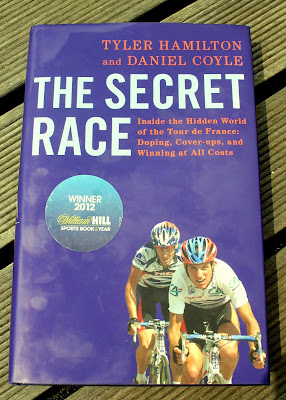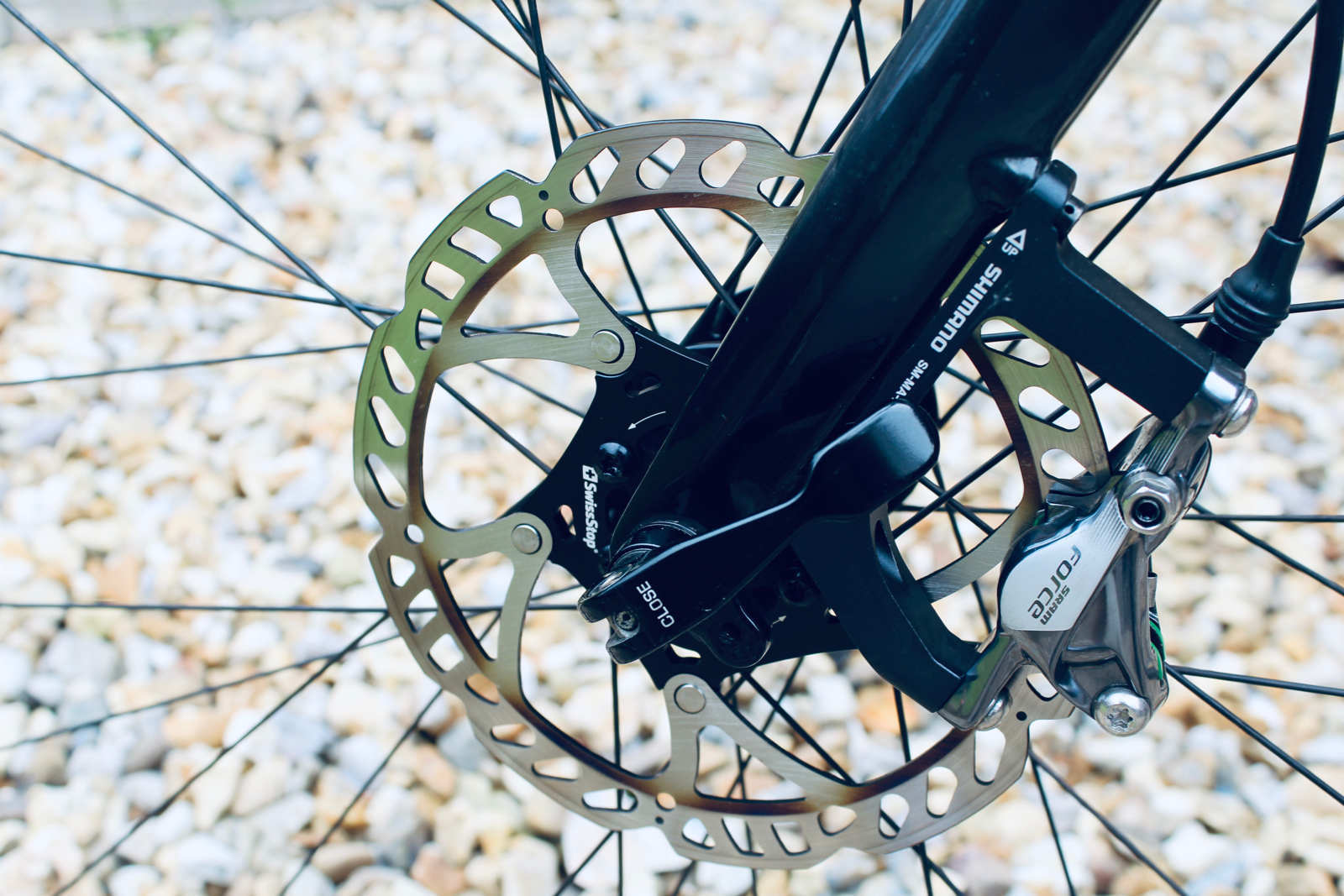Review: Tyler Hamilton & Daniel Coyle's - 'The Secret Race'
"(This is) my story. Not a shiny, pretty myth about superheroes who win every time, but a human truth about one normal guy who tried to compete in a messed-up world and did his best; who made big mistakes and survived. That's the story I want to tell, and keep telling, partly because it will help the sport move forward, and partly because it helps me move forward" (p. 276)
Tyler Hamilton's story is a stark opposite to Lance Armstrong's best seller 'It's Not About The Bike'. This is not fiction, but fact; not an elaborate fairytale, but a brutal truth; not a money making scheme, but a confession.
Hamilton and Coyle give the truth, the whole truth, and nothing but the truth; they take you deep into the personal and professional life of Hamilton during his successful cycling career in the 1990s and early 2000s. Then, into his subsequent years of legal battles and law suits; initially trying to claim his own (false) innocence, and then later confessing the truth in a bid to open the world's eyes to the elaborate lie that was the success of the US Postal Service cycling team under Lance Armstrong's leadership.
The word 'empathy' best describes my emotions on finishing Hamilton's account. This was a man that never wanted to dope, never wanted to cheat; but felt forced into doing so by the pressure to compete, and the pressure from his team. Wanting only to achieve the highest possible level in his sport, Hamilton's story soon shows that in order to do so in the 1990/2000s you had to dope, had to give in, otherwise there was no hope of "levelling the playing field". He highlights how doping became an arms race between the sports "doctors" (including in particular the infamous Dr. Ferrari); an arms race where the riders were simply the pawns in a giant game of chess.
Hamilton's book is not a justification of doping, far from it, it thoroughly condemns the practice. However it does show that in the eyes of many, if not all, of the top riders at this time, it was a necessity. I think before we brand all dopers with the words "Dopers Suck", one must look at the bigger picture, see the riders' point of view, and question "What would you do?". Would you work tirelessly to get close to the top of your sport then sit back and watch others take the unfair advantage? Would you retire? Or would you give into the drugs and enable yourself to compete? It's a hard question to answer, but it is certainly one that has to be asked, before we condemn all cyclists in this era as liars and cheats.
What surprised me most, and shocked me, was Hamilton's account of Lance Armstrong's behaviour. As a teenager I fully admit I was an Armstrong supporter; I had posters, I had the books, I had watched all the documentaries. By 2013 however, when I heard his confession on Oprah, it was a moment of confirmation of something I had suspected for some time; like so many in his era, Lance too had doped.
What I had not realised was the attitude Lance took with his team mates, his doctors, and the legal battles that followed his career. As Hamilton puts it "Lance would do anything to win... anything."; as if it was almost a disease that Lance suffered from. That "anything" included firing lifetime friends from the team when they could be replaced by better riders, bullying riders into taking EPO, bullying the UCI and laboratories into covering up tests, and hiring the best lawyers money could buy to protect him from accusations of the truth. 'The Secret Race' changed my view of Armstrong; this man is far more a villain than a hero, all be it a villain who still had incredible athletic ability.
I would strongly urge all cyclists who are interested in the history of our sport to read 'The Secret Race'. It's not necessarily an enjoyable read, but it is a good read, and it teaches you a huge amount about the sport's past. It also teaches us to be thankful that the past is the past, and that in the modern cycling age things are rapidly moving towards a cleaner "level playing field". Doping will always be a stain on the blanket of cycling's history; but before trying to cover up that stain, we should realise how it got there and what allowed it to remain for so many years before things began to change.
Tyler Hamilton's story is a stark opposite to Lance Armstrong's best seller 'It's Not About The Bike'. This is not fiction, but fact; not an elaborate fairytale, but a brutal truth; not a money making scheme, but a confession.
Hamilton and Coyle give the truth, the whole truth, and nothing but the truth; they take you deep into the personal and professional life of Hamilton during his successful cycling career in the 1990s and early 2000s. Then, into his subsequent years of legal battles and law suits; initially trying to claim his own (false) innocence, and then later confessing the truth in a bid to open the world's eyes to the elaborate lie that was the success of the US Postal Service cycling team under Lance Armstrong's leadership.
The word 'empathy' best describes my emotions on finishing Hamilton's account. This was a man that never wanted to dope, never wanted to cheat; but felt forced into doing so by the pressure to compete, and the pressure from his team. Wanting only to achieve the highest possible level in his sport, Hamilton's story soon shows that in order to do so in the 1990/2000s you had to dope, had to give in, otherwise there was no hope of "levelling the playing field". He highlights how doping became an arms race between the sports "doctors" (including in particular the infamous Dr. Ferrari); an arms race where the riders were simply the pawns in a giant game of chess.
Hamilton's book is not a justification of doping, far from it, it thoroughly condemns the practice. However it does show that in the eyes of many, if not all, of the top riders at this time, it was a necessity. I think before we brand all dopers with the words "Dopers Suck", one must look at the bigger picture, see the riders' point of view, and question "What would you do?". Would you work tirelessly to get close to the top of your sport then sit back and watch others take the unfair advantage? Would you retire? Or would you give into the drugs and enable yourself to compete? It's a hard question to answer, but it is certainly one that has to be asked, before we condemn all cyclists in this era as liars and cheats.
What surprised me most, and shocked me, was Hamilton's account of Lance Armstrong's behaviour. As a teenager I fully admit I was an Armstrong supporter; I had posters, I had the books, I had watched all the documentaries. By 2013 however, when I heard his confession on Oprah, it was a moment of confirmation of something I had suspected for some time; like so many in his era, Lance too had doped.
What I had not realised was the attitude Lance took with his team mates, his doctors, and the legal battles that followed his career. As Hamilton puts it "Lance would do anything to win... anything."; as if it was almost a disease that Lance suffered from. That "anything" included firing lifetime friends from the team when they could be replaced by better riders, bullying riders into taking EPO, bullying the UCI and laboratories into covering up tests, and hiring the best lawyers money could buy to protect him from accusations of the truth. 'The Secret Race' changed my view of Armstrong; this man is far more a villain than a hero, all be it a villain who still had incredible athletic ability.
I would strongly urge all cyclists who are interested in the history of our sport to read 'The Secret Race'. It's not necessarily an enjoyable read, but it is a good read, and it teaches you a huge amount about the sport's past. It also teaches us to be thankful that the past is the past, and that in the modern cycling age things are rapidly moving towards a cleaner "level playing field". Doping will always be a stain on the blanket of cycling's history; but before trying to cover up that stain, we should realise how it got there and what allowed it to remain for so many years before things began to change.





Comments
Post a Comment